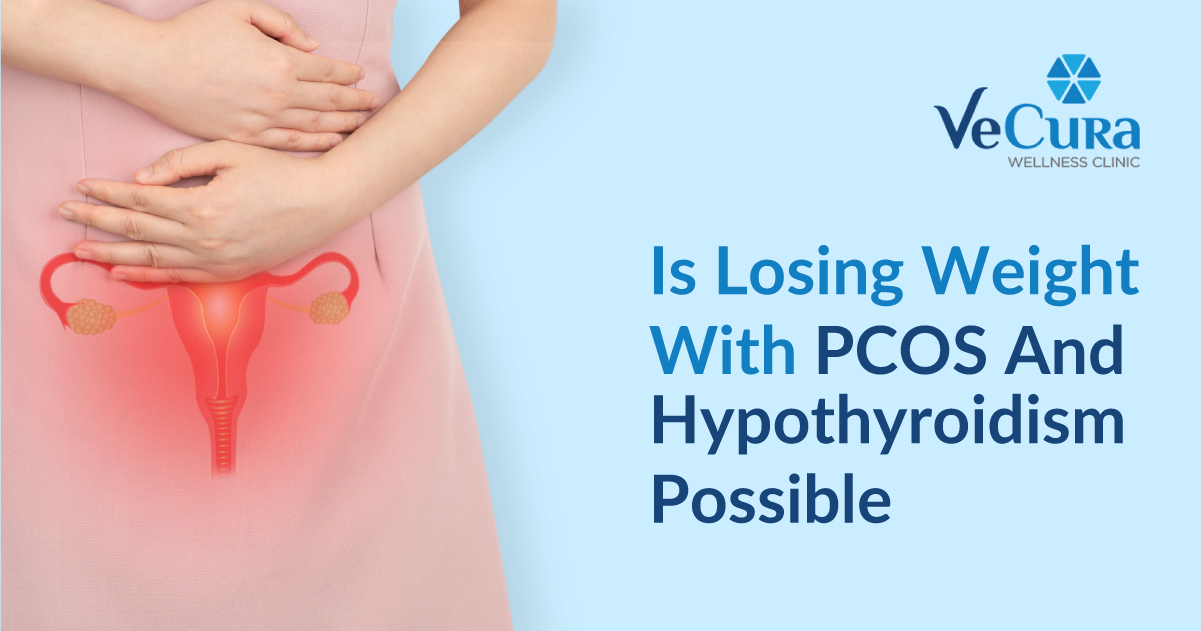If you have PCOS or hypothyroidism, you would know the many difficulties that come with it, especially the problem of weight loss. If you’re wondering whether losing weight with PCOS and hypothyroidism is possible, the simple answer is: YES, it is.
Want to know how? Read till the end of the blog to know more!
Losing weight is a tiring task for anyone, but it can feel like an uphill battle for women with PCOS and hypothyroidism. These two conditions affect millions of women worldwide and can wreak havoc on their hormones, metabolism, and overall health.
But don’t lose hope just yet! With the right approach and some patience, it is absolutely possible to achieve your weight loss goals!
In this blog post, we’ll explore the challenges of losing weight with PCOS and hypothyroidism and provide tips to help you overcome the same. Keep reading to learn more!
PCOS and Hypothyroidism: What Are They?
Polycystic ovary syndrome (PCOS) and hypothyroidism are two common hormonal disorders affecting many women around the world. With PCOS, the ovaries overproduce androgen hormones, which can lead to irregular menstruation cycles, ovarian cysts, and difficulty getting pregnant. It is also linked to insulin resistance, which increases the risk of type 2 diabetes and causes weight gain, elevated blood sugar levels, and insulin resistance.

On the other hand, hypothyroidism is a disorder in which the thyroid gland fails to generate adequate thyroid hormones, which are in charge of controlling body temperature, heart rate, and metabolism.
Fatigue, weight gain, dry skin, hair loss, and depression are all signs of hypothyroidism. Both PCOS and hypothyroidism can significantly impact a woman’s health and quality of life.
Tips: Also check the How Can A Vegan Diet Help You Lose Weight?
PCOS, Hypothyroidism, and Weight Gain: What’s the Connection?
Both PCOS and hypothyroidism are two medical conditions that disproportionately affect women and can contribute to weight gain.
According to research, there is a significant overlap between these two conditions, with PCOS women being more likely to have hypothyroidism. This could aggravate weight gain and other symptoms of the two conditions, such as fatigue and trouble reducing weight.
In order to effectively manage their symptoms, women with PCOS and/or hypothyroidism must adopt a comprehensive strategy that includes lifestyle changes, including healthy eating, regular exercise, stress management, and any necessary medical care.
Tips: Also check the How to Reduce Stress And Weight Gain?
Is it Possible To Losing Weight With PCOS and Hypothyroidism?
Yes, it is possible to lose weight with PCOS and hypothyroidism, but it can be more challenging due to the impact of these conditions on metabolism and hormone regulation.
Adopting a healthy lifestyle that includes regular exercise and a balanced diet is the key to losing weight when you have PCOS and hypothyroidism. This may help in controlling insulin and hormone levels and enhancing metabolism.

Supplements and treatments that boost metabolic function and control hormone levels may also be helpful for PCOS and hypothyroidism patients.
It’s important to keep in mind that weight loss for women with PCOS and hypothyroidism may take longer and involve more effort. It may not be possible to achieve considerable weight loss without medical intervention.
How Do You Treat PCOS and Hypothyroidism?
Treatment for both these conditions may involve a combination of lifestyle changes, medications, and sometimes, surgical intervention.
- For PCOS, lifestyle modifications are often recommended as the first line of treatment. This includes regular exercise, weight management, and a healthy diet.
- A healthcare professional may also recommend medication to control hormone levels and alleviate symptoms, such as hormonal contraceptives, insulin sensitizers, and anti-androgens.
- In the case of hypothyroidism, treatment involves hormone replacement therapy to replace the missing thyroid hormone.
- Oral synthetic thyroid hormone therapy is used for this. Regular blood tests are necessary to confirm the correct dosage, and the amount of medication needed will depend on how severe the condition is.
It is important to note that treatment for PCOS and hypothyroidism is not a one-size-fits-all approach, and the treatment plan should be tailored to the individual’s unique needs and health status.
It is crucial to work with a healthcare provider to determine the most effective treatment plan for these conditions.
What Are The Best Foods For Hypothyroidism and PCOS?
When it comes to managing hypothyroidism and PCOS through diet, the focus should be on whole, nutrient-dense foods that support healthy hormone production and metabolism.
Here are some of the best foods to incorporate into your diet
- Healthy Fats: Healthy fats are crucial for hormone regulation and satiety. Foods with healthy fats include olive oil, avocado, almonds, and seeds.
- Gluten-Free Grains: Gluten-free grains like quinoa, brown rice, and buckwheat are good choices for people who are intolerant to or sensitive to gluten.

- High-fibre Vegetables: Vegetables with high fibre content, such as broccoli, kale, spinach, and cauliflower, can support a healthy digestive system and help control insulin levels.
- Low-Glycemic Fruits: Berries, apples, and pears are great options for controlling blood sugar levels as they are low in sugar and high in fibre.
- Lean Proteins: Proteins that are low in fat and calories, like chicken, turkey, fish, and tofu, are essential for the metabolism and synthesis of hormones.
- Probiotic-Rich Foods: Yoghurt, kefir, and kimchi are examples of probiotic-rich foods that can maintain healthy gut bacteria, which is essential for controlling hormones and reducing inflammation.
Remember, everyone’s dietary needs are different, so it’s important to work with a healthcare professional or registered dietitian to develop a personalized nutrition plan that works best for you.
VeCura Wellness: The Perfect Place For Easy and Safe Weight Loss
VeCura Wellness offers The Premier Plus Weight Loss plan for easy and safe weight loss, using a range of treatments that boost metabolism, burn calories, and help tone the body.
Note: To explore more engaging content and stay connected, feel free to visit VeCura Wellness YouTube channel for exciting videos, insightful discussions, and much more.
A wellness expert will guide you through the process with a personalized consultation. Our sessions are designed in such a way that there is absolutely zero downtime post-treatment!
Choose VeCura Wellness for your weight loss needs for safe and scientific treatments, personalized consultations, and session-based treatments!
Conclusion
While losing weight with PCOS and hypothyroidism can be challenging, it is definitely possible with the right approach.
By adopting healthy eating habits, regular exercise, stress management techniques, and possibly taking recommended supplements, women can achieve their weight loss goals and improve their overall health.
It may take some patience and persistence, but with determination and a positive mindset, your weight loss goals are very much within reach! And if you’re looking for weight loss experts to guide you through the process, don’t forget to contact us at VeCura Wellness!
Frequently Asked Questions (FAQs)
1. Are PCOS and hypothyroidism related?
PCOS and hypothyroidism can be related as both are endocrine disorders. Due to hormonal imbalances, women with PCOS are more likely to develop hypothyroidism.
2. Does PCOS affect the thyroid?
PCOS can indirectly affect the thyroid by influencing hormone levels such as insulin, estrogen, and testosterone. These imbalances can increase the risk of hypothyroidism.
3. Can you have PCOS without thyroid problems?
Yes, it is possible to have PCOS without having thyroid issues. While the two conditions are related, they are different disorders; and not everyone with PCOS develops thyroid problems.









0 Comments